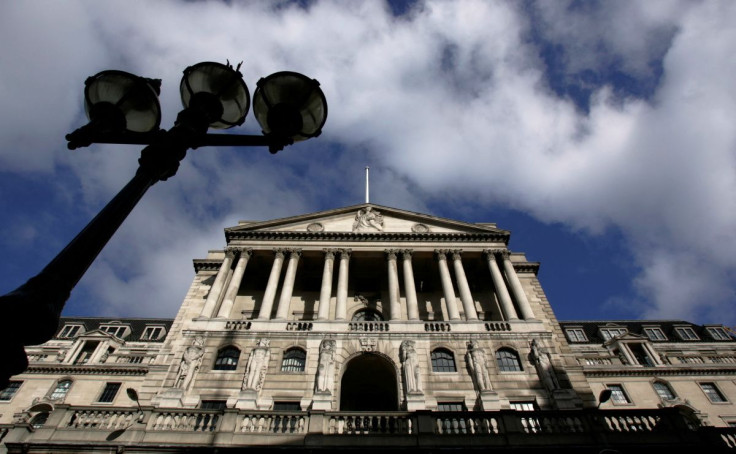Analysis-Rise And Fall: Economists And BoE Split On Pace Of Inflation Drop

British inflation is on track to peak at a 30-year high of over 7% in April but differences in forecasts for energy prices and wages mean private-sector economists and the Bank of England are split over what happens next.
A Reuters poll of economists this week showed inflation plunging back to 2.2% in the three months to June 30 2023, mirroring the sharp fall after inflation last reached this high in Britain in the early 1990s.
But the BoE's Feb. 3 forecast predicts inflation of around 3.5% in Q2 2023, saying it will not fall close to its 2% target until early 2024, citing potentially persistent pressures from energy prices, supply chains and wage demands as the economy emerges from the coronavirus pandemic.
"The gap's been there for a while. But it is particularly stark at the moment," said Chris Hare, an economist at HSBC.
Since its first detailed forecasts in 2004, the BoE has never forecast inflation will be so far above its 2% target for so long, squeezing living standards for British households and creating a headache for Prime Minister Boris Johnson's government.
These forecasts have played a role in pushing up expectations in financial markets for BoE interest rate rises this year, economists say - even if a closer look at the BoE's message suggests it has no intention of raising Bank Rate to the 2% level that markets have priced in by the end of 2022.
"Market expectations are a little bit too hawkish in the medium term, despite the fact that there's a load of strong inflation to get through between now and then," said Hare, who forecasts rates will stay on hold after reaching 1.25% in August.
The BoE estimates consumer price inflation will peak at around 7.25% in April when energy tariffs leap by 54%.
A large part of the gap in inflation forecasts thereafter is based on differences about energy prices.
Most economists use futures markets for the outlook for energy prices which show British natural gas prices almost halving by June next year.
The BoE, by contrast, looks at futures prices only for the next six months and assumes they do not change after that because futures have not always given a good steer on long-term energy price trends.
The BoE's approach to energy prices had been reasonable in the past, but now meant that it was assuming an unprecedented surge in gas prices would prove to be long term, said Benjamin Nabarro, economist at Citi.
"Clearly, as things stand, they're only capturing one half of what is a very exceptional price move," he said.
BoE officials have said inflation could fall a lot faster than their central forecast, possibly to just 1.2% in early 2024 if energy prices follow market expectations just ahead of the BoE's February meeting.
However, Governor Andrew Bailey has also warned of upside risks to energy prices and inflation if tension between Russia and Ukraine escalates.
Other complications include the impact of government measures to reduce the hit to households from energy price rises. Economists do not know if Britain's official statisticians will treat them as price reductions - which would lower inflation - or as a type of income, which would not.
WAGE PRESSURE
Another area of difference is whether high inflation and a tight labour market bring outsize wage demands.
The central bank says businesses it polled expect to raise pay by nearly 5% this year - much higher than increases of about 3% in the main private-sector surveys of employers.
Official figures on Tuesday showed wages rose by an annual 4.3% in the final quarter of 2021 - faster than both the BoE and economists expected, though below inflation.
Bailey this month urged workers to rein in requests for higher pay, drawing criticism from unions.
Surges in 2008 and 2011, when inflation briefly rose above 5%, did not lead to 1970s-style wage spirals.
But the BoE may be wary about extrapolating from lower peaks a decade ago.
"People simply become much more aware, and much more sensitive to changes, when you're talking about inflation that's 7%, rather than 3%," Nabarro said.
Citi's own survey has shown the British public's inflation expectations for 12 months' time at their highest since the series began in 2006 - a warning sign for the BoE.
But Nabarro does not think inflation is likely to get out of control.
The squeeze on disposable income - the steepest in 30 years - will probably curb spending although savings built up by many richer households during the pandemic may keep a flame under inflation.
These uncertainties - alongside big questions about Russia and Ukraine - help explain another gulf, the one between economists' and financial markets' expectations for BoE action this year.
While markets price-in rates climbing to 2% by December, most economists in the Reuters poll see them going no higher than 1%. But the risk is one-way - 83% said rates were likely to rise by more rather than less than they forecast.
© Copyright Thomson Reuters {{Year}}. All rights reserved.




















